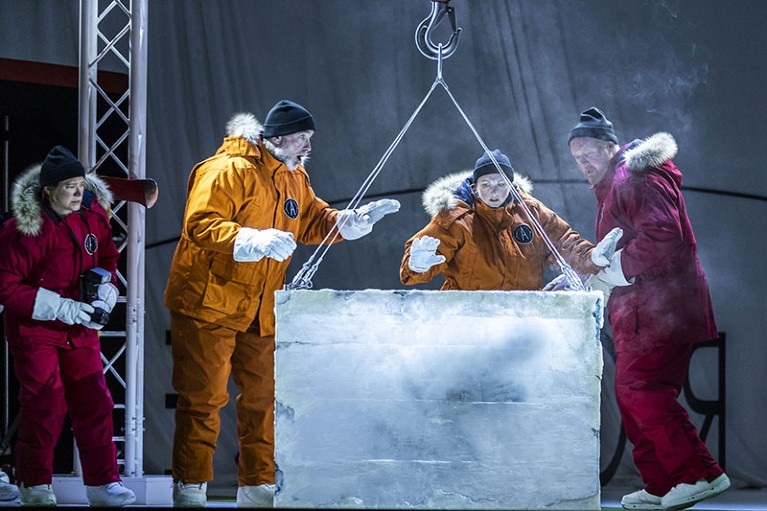
Left to right: Sarah Champion, Stephen Gadd, Jeni Bern and Mark Le Brocq in Anthropocene.Credit: James Glossop
Anthropocene Music: Stuart MacRae; Words: Louise Welsh Scottish Opera; Hackney Empire, 9 February 2019.
Stranded in a harsh, isolated environment, a small group of explorers begins to argue. Ultimately, the protagonists sink into despair, with potentially deadly consequences. This plot features in literary masterpieces from William Shakespeare’s 1611 The Tempest to Mary Shelley’s 1818 novel Frankenstein. Now, an opera claiming both works as inspiration harnesses the idea to explore human-driven climate change.
Anthropocene, by composer Stuart MacRae and librettist Louise Welsh, is not the first opera to be inspired by environmental catastrophe. Giorgio Battistelli’s 2015 CO2, essentially a lecture set to music, was based on the blockbuster documentary featuring Al Gore, An Inconvenient Truth (2006). MacRae’s three-act work is more of a thriller, nodding to science in references to ice cores, the aurora borealis and the human meddling with the environment that is name-checked in the title.
Here, however, the Anthropocene is not just the geological epoch that bears our grubby fingerprints; it is also the name of an Arctic research ship funded by a philanthropist, who voyages with his daughter to make profound but unspecified discoveries about the origins of life. The crew also includes two scientists, two sailors and a journalist. As in the 1914–17 expedition of Antarctic explorer Ernest Shackleton, the ship becomes stuck in ice as winter approaches, with ensuing repercussions.
The action centres around a woman the crew digs out of the ice. Improbably, she is alive. Dubbing her Ice, the group hails her as the scientific discovery of the century. Perhaps representing both hope and the risks of technological advance, she was — we learn — sacrificed during an earlier environmental crisis. However, the crew’s reaction to finding Ice is where the scientific credibility of the piece starts to fall down — not least in the hyperbolic comparison one member makes to the discoveries of Isaac Newton, Charles Darwin and Marie Curie.
Musically, the opera fares much better. The score uses atonal and tonal passages that, with the minimalist white set, successfully evoke polar realms. The singing is excellent, notably from soprano Jennifer France as Ice, mezzo-soprano Sarah Champion as the philanthropist’s determined daughter and bass-baritone Paul Whelan as the ship’s captain.
It’s also refreshing to see the role of the lead scientist written for a woman, soprano Jeni Bern. Neither libretti nor laboratories have admirable records in this respect — operatic heroines are generally victims or temptresses, and science routinely ignores the contributions of women. At a more profound level, it is the female characters who demonstrate a deep understanding of the group’s existential plight, whereas the men are full of bluster, arrogance and rather simplistic faith in technical solutions to their problems. The women’s trio towards the end is a musical highlight.
So, is Anthropocene a straightforward story of power, adventure and sacrifice, with echoes of great works? Certainly, as in The Tempest, there is a shipwreck and an encounter with a powerful, ethereal being (some of Ice’s high soprano lines resemble those of Ariel in Thomas Adès’s 2004 opera of that play). And, as in Frankenstein, the protagonists unleash a powerful being whom they cannot quite control. However, there is nothing in Anthropocene that reaches such levels of sophistication and nuance.
The opera offers the ingredients for an exploration of climate change — extreme weather, scientific enquiry, civilization on the brink of collapse — but overall I feel that an opportunity has been missed to engage with the defining issue of our age. Admittedly, this was not the opera’s stated intention; but, in that case, its title is mere provocation.





